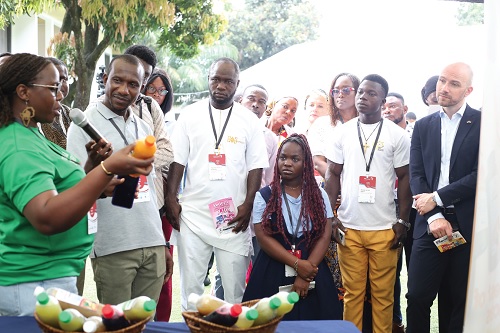The 2SCALE Programme, an agriculture initiative that builds inclusive agribusiness partnerships to support farmers, small and medium enterprises (SMEs) and the private sector, has officially ended in Ghana, with stakeholders underscoring the need for knowledge exchange and sustainability to preserve its decade-long impact.
Funded by the Government of the Netherlands, the 2SCALE initiative — “Toward Sustainable Clusters in Agribusiness through Learning in Entrepreneurship”, has strengthened value chains, improved food security and created jobs by connecting business champions, farmer groups and service providers in innovative partnerships.
At a ceremony to officially close the initiative, which took place last Thursday in Accra, there were representatives from the government, private sector players, farmer organisations and civil society actors.
The First Secretary and Head of Economic Affairs at the Embassy of the Kingdom of the Netherlands, Dr Rens Twijnstra, on behalf of Ambassador Jeroen Verheul, said the programme had played a pivotal role in reshaping agribusiness practices in Ghana.
“For more than 10 years, 2SCALE has been at the forefront of inclusive agribusiness partnerships in Ghana and across Africa,” he said.
“Beyond the statistics of farmers reached or SMEs supported, the true impact lies in how business models have evolved and how cooperation between public and private actors has created change that will last beyond this project," he added.
He emphasised that long-term sustainability required strong commitment from private sector actors.
“Ultimately, sustainability means that farmers and entrepreneurs can thrive without relying on development systems,” Dr Twijnstra noted.
Knowledge transfer
On his part, the Multi-Country Project Manager for 2SCALE, Jalil Zakaria, said the programme’s legacy depended on knowledge transfer to national stakeholders.
“Lessons, innovations and best practices from 2SCALE must be taken up, adapted and scaled by Ghana’s government institutions, farmer organisations, civil society and the private sector.
Our idea has always been to ensure that the impact outlives the programme," he said.
He explained that 2SCALE’s design acknowledged its defined lifespan but prioritised handing over models that Ghanaian actors could sustain.
“The real measure of success is that inclusive agribusiness partnerships can continue to thrive under local leadership,” he added.
Mr Zakaria further pointed out that in Ghana, the programme had facilitated five inclusive agribusiness partnerships across different value chains.
One example was the Rockland partnership in the poultry sector, which reached over 37,000 base-of-the-pyramid consumers with chicken products, improved productivity for more than 88,000 smallholder farmers, engaged five SMEs and created hundreds of non-farm jobs.
Sustainability
The Executive Director of Social Enterprise Ghana, Edwin Zu-Cudjoe, who is a strategic partner of the initiative, said his organisation was ready to take up the challenge of sustaining and scaling lessons from 2SCALE.
“The way forward is to build communities of inclusive MSMEs that can continuously access training, capacity building and investment opportunities.
We are committed to integrating the best practices from 2SCALE into our national network of inclusive businesses," he said.
He added that investment remained the biggest gap in the inclusive MSME space and called for stronger connections with impact investors.
The Chief Executive Officer of the Ghana Chamber of Young Entrepreneurs, Sherif Ghali, described 2SCALE as a model of how public-private partnerships could empower youth and small businesses.
“For young entrepreneurs, the lessons from 2SCALE are invaluable because they show that inclusive business models can work and can be scaled.
Our task now is to take these models, adapt them and use them to create jobs and opportunities for the next generation," he stated.

